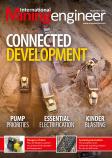Volvo Construction Equipment is collaborating with its customer Colas on a research project that has seen the company develop and test a range of concepts and prototypes that contribute towards improved work site safety. As part of the ‘Safer@Work’ research project, Volvo CE recently tested a people detection system at two Colas sites: an asphalt plant and a quarry in Switzerland.
The concept uses Artificial Intelligence (AI) to alert the operator when a person is detected in the vicinity of the machine. It incorporates different warning systems, both for the operator and for people in the area surrounding the machine. Volvo CE engineers were already developing the integrated AI algorithm and it was further improved during the Safer@Work project. The prototype is one of three operator assist concepts that Volvo CE has been collaborating on with Colas since 2016. Currently this work is part of a research project to prove the technology is viable for the industry. Plans for industrialisation are under investigation.
“Safety is one of Volvo CE’s core values and we are actively working to create even safer work sites for employees, customers and anyone in the vicinity of our machines,” said Veit Kleeberg, Chief Project Manager for Safer@Work at Volvo CE. “When Colas approached us to partner on this research project we were keen to get involved. We used the ‘Design Thinking’ methodology – which involves putting the user first and finding out their needs before generating ideas – and came up with 27 concepts that could contribute to reducing the number of accidents involving employees and members of the public on construction sites. Together with Colas, we picked the three preferred concepts and we started to design and test them.”
The latest tests in Switzerland, marked the third round of testing and demonstrations that Volvo CE has carried out on excavators, wheel loaders and articulated haulers at Colas job sites. The people detection concept was tested on a EW160E excavator and a L220H wheel loader.
“The testing was a great success and the operator feedback was very encouraging,” said Veit. “This time we were focusing on the accuracy of the concept, after we’d made some improvements following tests with Colas in January. Being able to test the technology in a real-world environment and getting instant customer feedback is invaluable. This partnership has enabled us to investigate new technologies and explore concepts that add value for our customers and address our ambitions such as zero accidents.”





















